Click To Top of Page
Questionable Insurance Payment Delays



Confusion or Extortion?

 July 8, 2006 - In casinos, one of the benefits enjoyed by the house is the right to set the rules. If the house rules are hopelessly skewed, customers usually pick up their marbles and roll out. When there�s only one game in town, that�s not an option. Since government regulations are designed to preclude monopolies from publicly flourishing, their victims are usually limited to the politically impotent. However, when competition is eliminated by economic developments as opposed to industry intrigue, a company can freely operate in the ensuing market vacuum, often with the blessing of the regulatory agencies normally charged with punishing monopolistic practices.
July 8, 2006 - In casinos, one of the benefits enjoyed by the house is the right to set the rules. If the house rules are hopelessly skewed, customers usually pick up their marbles and roll out. When there�s only one game in town, that�s not an option. Since government regulations are designed to preclude monopolies from publicly flourishing, their victims are usually limited to the politically impotent. However, when competition is eliminated by economic developments as opposed to industry intrigue, a company can freely operate in the ensuing market vacuum, often with the blessing of the regulatory agencies normally charged with punishing monopolistic practices.
Following Hurricane Andrew, enlightened self-interest served to unite Florida�s insurance industry. The $20 billion in sustained damages threatened to undermine a competitive insurance market in the State of Florida. While ostensibly created to ground the shaken industry on firmer footing and oppose annual political attempts to lower rates, the newly unified Florida insurance industry discovered an unexpected dimension to their alliance. In addition to protecting participating carriers from legislative threats to their bottom lines, they explored potential pro-active postures.
 However, the industry�s big gun � the threat to leave the State � was an extremely risky gambit. If some players left while others stayed, those remaining would reap a huge competitive benefit at the expense of their departing brethren. This double-edged sword gave solace to Tallahassee bureaucrats charged with industry negotiations. When the 2004 serial storms justified a reconsideration of industry strategy and State insurance policy, the pieces fell into place. Who would blame them for bailing out of a sinking ship?
However, the industry�s big gun � the threat to leave the State � was an extremely risky gambit. If some players left while others stayed, those remaining would reap a huge competitive benefit at the expense of their departing brethren. This double-edged sword gave solace to Tallahassee bureaucrats charged with industry negotiations. When the 2004 serial storms justified a reconsideration of industry strategy and State insurance policy, the pieces fell into place. Who would blame them for bailing out of a sinking ship?
 |
| QBE CLAIMS PROCESSING? |
With the onset of the insurance crisis, an Australian insurance company that scooped up a healthy slice of the South Florida homeowners market, QBE, was presented with a unique opportunity. Following Hurricane Wilma, the handful of carriers still remaining in the State prepared to join their already departed peers. The industry had successfully implemented its strategy of temporarily abandoning the State to elicit a more favorable regulatory environment. Although they didn�t skip town, QBE will also reap the regulatory benefits of their industry�s strategy. Their catbird status as the sole remaining rated carrier enabled them to withhold desperately needed uncontested benefits free of concern about losing business to competitors. It immunized them against any �good will� penalty that ordinarily deters unethical behavior. By holding undisputed insurance proceeds hostage to concessions on unrelated claims, carriers can pressure desperate policyholders into accepting unfavorable settlements.
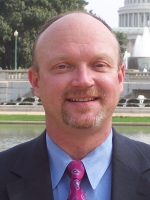 |
FLORIDA OIR COMMISSIONER
KEVIN M. MCCARTY |
Many Associations that expeditiously filed the appropriate insurance claims last November, submitted the proper Proof of Loss forms, underwent multiple inspections and claims adjustments are being summarily ignored by their insurers. Agents, Brokers and Adjusters have had to manufacture a stream of razor-thin excuses for the company�s lack of response. When an Association Attorney officially notices the company, they respond with a request for some obscure document or additional unrelated discovery. It is apparent that these unjustifiable dilatory practices are outside the ordinary claims process. In addition to the many Galt Mile Associations dependent on insurance proceeds to complete critical repairs, these institutionalized delays have adversely impacted frustrated policyholders all over the State.
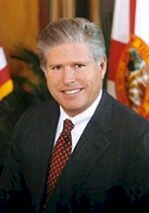 |
| Florida CFO TOM GALLAGHER |
To address this problem, the Florida Department of Financial Services (DFS) operates a condominium mediation program which provides a forum to discuss outstanding claims directly with a representative of the Association�s insurance carrier. As described by Florida CFO Tom Gallagher last December, �During the 2005 session, state lawmakers passed legislation to expand our department�s mediation program to condominium associations. Set up in 2004, the mediation program has helped more than 11,000 homeowners reach a satisfactory settlement on their hurricane claims. In partnership, the Department of Business and Professional Regulation is assisting DFS to urge condominium associations to participate in the mediation program and help facilitate prompt and fair settlement of outstanding claims.� On March 13, 2006, Florida Office of Insurance Regulation Commissioner Kevin M. McCarty issued an informational memorandum explaining the terms of Rule 69JER06-01, �Mediation Procedures for Resolution of Disputed Personal Lines Insurance Claims Arising from the 2004 and 2005 Hurricanes and Tropical Storms� - as required by 627.7015(4) in the Florida Statutes. By law (627.7015(3), F.S.), the insurance company picks up the tab for the program�s administrative costs and the mediator�s $300/hour fee.
To participate in the program, an Association should complete a Commercial Residential Mediation Request Form (Form No. DFS-I1-1669, Revised 3/06) and return it to the Department of Financial Services. Forms are available by calling the Department at 1(800) 227-8676 (1-800-22-STORM), by faxing the Department at (850) 488-6372, or by logging onto the Department�s website at http://www.fldfs.com and clicking on the �Condo Mediation� icon. Then click on the �Commercial Residential Mediation Request� link. Once the Department receives your completed Commercial Residential Mediation Request Form, your insurance company will be notified, and will have 21 days to settle your claim before your request for mediation is further processed. If the carrier fails to do so, the department will select an accredited mediator and schedule a conference. For Associations hoping to promote movement on a claim, success will depend upon the adequacy of their preparation. Minimally, the Association should be prepared to produce:
- A document by which the Association�s governing board designates an authorized representative that includes the name of the condominium or cooperative, the name of the association, the date of the meeting at which the designation was made, the name of the designated individual(s), and the authority granted to said individual(s).
- A copy of the relevant insurance policy and all correspondence(s) with the company (and/or agents/adjusters) regarding the claim;
- A detailed report prepared by a professional in the field regarding the losses sustained as a result of the storm. The use of a design professional (engineer or architect) is generally best, but under some circumstances a report prepared by a licensed general contractor will suffice. The report must distinguish between those portions of the building maintained and insured by the Association and those portions for which the individual unit owners are assigned responsibility.
- A complete analysis of the policy with particular attention to any exclusions; and
- A complete report, with all supporting documentation, of any expenses incurred for mitigation, any emergency rehabilitation/repairs and other losses under the policy.
 The documentation should be an authoritative compilation of professional reports and opinions. Its presentation should also be professional, guided primarily by the Association attorney. Despite the mediation�s supposed confidentiality, any documentation presented or information revealed at the conference is fair game for any surreptitious agenda. The carrier is entitled to use any volunteered information, documentation, or other meeting work product to its advantage, possibly resulting in support for the claim�s denial. To avoid inadvertently contributing to additional processing delays or a denial of benefits, Association counsel should be assigned responsibility for composing the presentation and selecting the materials supportive of the Association�s claim.
The documentation should be an authoritative compilation of professional reports and opinions. Its presentation should also be professional, guided primarily by the Association attorney. Despite the mediation�s supposed confidentiality, any documentation presented or information revealed at the conference is fair game for any surreptitious agenda. The carrier is entitled to use any volunteered information, documentation, or other meeting work product to its advantage, possibly resulting in support for the claim�s denial. To avoid inadvertently contributing to additional processing delays or a denial of benefits, Association counsel should be assigned responsibility for composing the presentation and selecting the materials supportive of the Association�s claim.
The carrier�s representative is also bound by certain requirements. At the conference, the representative must produce:
- A copy of the policy and the entire claims file � the insurer�s rep must be conversant with the facts and circumstances of the claim as well as the policy�s provisions.
- Confirmation of authority to settle the full amount of the claim at the conclusion of the conference.
- If any inspection and/or adjustment of the property are required prior to a dispute being resolved, such inspection and adjustment shall occur before the mediation conference.
- A failure by the insurer to authorize its representative to settle the full amount of the claim at the conclusion of the conference or to inspect and adjust the property as necessary before the mediation conference shall constitute a failure to appear at the mediation conference.
If mediation fails to produce results, the Association should explore the advisability of legal action with its attorney. If the attorney concurs that the insurance company failed to settle the claim in good faith once its obligation became reasonably clear, they may be liable for additional damages. Inasmuch, raising the stakes may serve to gain the attention of questionably motivated carriers. Even if the mediation effort is unsuccessful, undergoing the process will bolster the Association�s contention that despite being afforded ample opportunity to fairly settle the claim, the carrier has negligently failed to fulfill its obligations under the policy!
Click To Top of Page
From the Office of Representative Ellyn Bogdanoff



PROPOSAL: COMPREHENSIVE REFORMS FOR THE FLORIDA PROPERTY INSURANCE MARKET
(Last updated 9/7/06)

 |
| Representative Ellyn Bogdanoff |
September 26, 2006 - Last December, District 91 Statehouse Representative Ellyn Setnor Bogdanoff discussed the insurance crisis with GMCA officials, reviewing some of the legislative options being considered prior to the 2006 session. Given Tallahassee�s disappointing lack of progress in ameliorating the insurance environment, Bogdanoff has committed to drafting a comprehensive proposal for reform. Characterizing insurance as �at the top of everyone�s list�, she has compiled �a working document� - evolving in response to the input and feedback she receives from constituents. The five years she spent as a partner in an independent insurance agency, �Setnor Byer Bogdanoff�, should serve to ground her recommendations - affording them the added benefit of being realistic, a dimension that some recently espoused proposals clearly lack. Since the insurance dilemma not only threatens every homeowner�s checkbook, but the entire State economy, having a Statehouse representative with a workable plan universally benefits every district property owner. Read on: - [editor]
 Bold reform measures are needed to fix our current property insurance crisis and provide Florida�s consumers with affordable property insurance rates. In addressing this problem, we can not treat the symptoms - but we must attack the systemic problems that are currently plaguing Florida�s homeowner�s property insurance market and are causing the lack of availability and affordability of policies. With Citizens Insurance now the state�s fastest growing homeowner property insurer, it is essential for the Legislature to establish the reforms necessary and correct the current trend for long term stability. Those reforms begin with taking a new approach as to the state�s role in the insurance market.
Bold reform measures are needed to fix our current property insurance crisis and provide Florida�s consumers with affordable property insurance rates. In addressing this problem, we can not treat the symptoms - but we must attack the systemic problems that are currently plaguing Florida�s homeowner�s property insurance market and are causing the lack of availability and affordability of policies. With Citizens Insurance now the state�s fastest growing homeowner property insurer, it is essential for the Legislature to establish the reforms necessary and correct the current trend for long term stability. Those reforms begin with taking a new approach as to the state�s role in the insurance market.
Short term measures to stimulate the market and reduce taxpayer exposure

Reduce the threshold for accessing the CAT Fund to $3.2 Billion (per storm season) in order to lower the re-insurance costs for private insurers and to provide a reliable safety net to protect taxpayers in the event of a catastrophic event.
Underwriting changes for citizen�s to encourage precautionary measures / reduce fraud exposure

 Transform the underwriting guidelines for Citizen�s Insurance to gradually reduce the state�s exposure as a primary insurer and eliminate its competitive position with private insurers. For markets where private insurers will assume risk, Citizens will need to maintain pricing structures in excess of actuarial sound premiums to encourage carriers to re-enter the market and remove policies from Citizens over the next three years.
Transform the underwriting guidelines for Citizen�s Insurance to gradually reduce the state�s exposure as a primary insurer and eliminate its competitive position with private insurers. For markets where private insurers will assume risk, Citizens will need to maintain pricing structures in excess of actuarial sound premiums to encourage carriers to re-enter the market and remove policies from Citizens over the next three years.
- Establish options for Loss Based Deductible Program (i.e., the smaller the claim/the smaller the deductible; and the larger the claim/the larger the deductible). This will help reduce fraud by establishing a deductible program based on a percentage of the loss, not as a percentage of the total property value/coverage. Such a program discourages the inflation of damage appraisals and provides the resources for homeowners to make necessary repairs to prevent future damage.
- Implement Florida�s Certified Safe Roof Program
- Establish a roof certification program based on the quality of construction, condition of structure and projected lifespan
- Approved experts will perform inspections and provide certifications
- Establish Zero Deductibles for Roofs
- Payment of roof claims based on the roof�s depreciated value (Example: A roof with a 20 year lifespan, as established by the certification process, is damaged in year 3 and the cost to replace the roof is 20,000, the insured would receive reimbursement on a pro rata basis based on actual cash value)
(Note: Citizens, as the leading homeowners market in Florida, should set the pace for underwriting guidelines that will shape the future of the Florida Homeowner policy in the private market.)
Other Consumer Mitigation Measures
- Provide continued State backed Low Interest Loans / Grant Programs for qualified individuals for Roof Repair and Replacement
 MySafeFloridaHome � Continue providing funding to encourage precautionary measures using general revenues and other potential revenue sources
MySafeFloridaHome � Continue providing funding to encourage precautionary measures using general revenues and other potential revenue sources
- Landscape Mitigation � Provide statewide standards to establish �hurricane friendly� landscape regulations. Supersede local ordinances that penalize homeowners that responsibly choose to hurricane proof their landscape.
- Require companies to establish minimum credits and publish their Premium Credits for mitigation available from private insurers. For example: a homeowner should know in advance what the premium saving will be for installing shutters, etc.
Regulatory changes to provide long term stability and predictability

In order to ensure long term stability, Citizen�s must eliminate its role as a primary insurer and stop its direct competition with the private insurance market. Additionally, Citizens must establish itself as an excess market � a safety net for Florida Homeowner�s Insurance.
Citizens will gradually reduce the state�s role as the primary insurer of risk, which will protect taxpayers in the event of a major hurricane. The creation of a state funded excess insurance product administered by the primary carriers should increase the availability of affordable primary coverage through the private market. This state funded product will provide an appropriate safety net for taxpayers by allowing them to fully insure their property, while limiting the voluntary market�s exposure. This �layered risk� approach will provide additional protection at levels below the catastrophic fund on a per risk basis, potentially reducing the cost of reinsurance for the private market and passing that cost saving to the consumer. Currently, the reinsurance costs in the private market are driving the premiums to excessive levels. This design should help ease that burden.
This new product will provide property coverage only on a �broad perils� basis to allow for better pricing than �wind� only coverage. No liability coverage will be afforded under this design.
Redefining the State�s role in insuring property risks

Over the course of a reasonable number of years, reform Citizens to make it a carrier providing only limited products, as well as the Florida Excess Coverage Carrier described above. This transition period will allow for insured�s to obtain coverage in alternative markets. In the event no market is available, then they will be able to obtain coverage through Citizens.
- Preclude Citizens from writing new HO3 policies (comprehensive homeowner�s policies including all risk coverage and liability) in order to limit state�s involvement, increase competition and encourage private carriers to return to the market
- Citizens will only offer DP1 or DP2 (policies that cover basic perils including fire and wind) for those risks that can not otherwise be insured through the private market. This action will convert Citizen�s into its intended purpose which is a True Market of Last Resort and a legitimate role for government (i.e., safety net). It is likely that the private market will respond and bring back the CPL policies that were once readily available in the market to protect an insured against liability losses.
- After a reasonable number of years, all policies that remain with Citizens, originally written as HO3s, will be converted to a DP1 or DP2. This strategy will reduce state�s exposure while allowing consumers and insurers to adjust to new regulatory environment. Insured�s will receive 12 months notice before a policy conversion takes place.
 Citizens as an authorized excess carrier, will provide insurance coverage over a specified primary limit ($100,000/$200,000/$300,000), which will be negotiated with each private insurance carrier based on their financial ability, However, no carrier will be permitted to choose a limit below $100,000.
Citizens as an authorized excess carrier, will provide insurance coverage over a specified primary limit ($100,000/$200,000/$300,000), which will be negotiated with each private insurance carrier based on their financial ability, However, no carrier will be permitted to choose a limit below $100,000.
- Citizens must charge actuarially sound premiums for its primary and excess products, as established by an independent board of experts under the purview of OIR.
Additionally, the current and future operations of Citizen�s must be transitioned to a private enterprise with the requisite experience and expertise in the insurance industry.
Eliminate financial incentives for insurers �taking-out� policies from Citizens.
Reforms in the private market to protect consumers

Eliminate the existing artificial and arbitrary wind only zones (such as East/West of I-95 line) and redefine actuarially and scientifically based Geographic Zones within the state. Additionally, eliminate the decisions to deny coverage based on an artificial characteristic such as date of construction.
Require private insurance companies to cover a minimum amount of coverage in each established zone based on their total capacity.
Provide Carriers with rating flexibility within a maximum allowable as established by an Independent Board with actuarial expertise and under the purview of OIR.
Establish regulatory incentives to encourage those carriers writing other lines of insurance to begin writing homeowners. Insured�s will be driven to those carriers that will pick up both their homeowners and auto coverage, which in turn will stimulate other carriers to do the same in order to retain their market share of the profitable risks.
 Provide incentives for multi-family dwellings/condo associations, etc. to increase reserves and self insure for minor damages
Provide incentives for multi-family dwellings/condo associations, etc. to increase reserves and self insure for minor damages
Ensure Independent financial stability for primary insurers
Eliminate exceptions to the Uniform Statewide Building Code
Advocate for changes and reforms at the national level

The establishment of a National Catastrophic Fund or a Coastal Coalition Catastrophic Fund
Create Hurricane Savings Accounts to allow individuals to save money tax free to pay for mitigation, damage to property, and self insurance.
Change Federal Tax policy to encourage carriers to retain more dollars in reserves
CONCERNS AND RESPONSES

�161 %� RATE INCREASE - Due to political pressures, rates have been artificially suppressed for many years and Citizens mandate to not compete with the private market increased rates to the current level. Although passage of any reform will not see immediate relief, it is anticipated that premiums will be reduced upon renewal. However, if Citizens takes aggressive measures to implement the underwriting changes discussed, insured�s could see immediate decreases in premium if they accept some of the coverage changes by endorsement.
FLORIDA ONLY COMPANIES � Carriers will not write in Florida if the rate structure jeopardizes the profit realized from other states. It has been stated repeatedly that there are 49 other states with much less risk than . After Hurricane Andrew, the parent company of Prudential Property and Casualty infused 1 billion dollars to save its Florida company out of a moral obligation to its policy holders. Companies could not continue to employ that strategy and continue to expect stockholders to tolerate it. However, each state controls the rate filings and regardless of where else a company writes coverage, companies consistently complain that it is difficult to get a rate filing through Florida. While at first glance this appears to be a protector to the public, it is discouraged competition in the marketplace further driving premiums up because Citizens remains the only viable market in Florida. Carriers will not write coverage if they cannot obtain sufficient premiums to sustain a catastrophic loss. This also serves the taxpayers, because the risk is transferred to the state for any carrier that closes its doors after a Hurricane. The last thing this state can afford is for insurance to compete with other state needs such as education, Medicaid, children�s services.
SURCHARGES � By Citizens charging actuarial sound rates, there should not be charges on the back end in the form of surcharges or increased taxes
REINSURANCE MARKET � Reducing primary insurance carriers need for re-insurance
CHERRY PICKING � Creation of scientifically justified geographical zones that require insurance companies to maintain a certain minimum risk based on their capacity in each zone. There will always be risks that the private market will refuse to cover due to loss history and/or the risk. For those risks that private market will not cover, Citizens will provide basic coverage.
BUILDING UP THE CAT FUND � The state should consider taking a portion of those revenues it provides to �rainy day� fund and transferring them to Cat Fund. We must be prepared for the predicted 100 billion dollar storm that will occur within the next 10-20 years.
ARBITRARY DECISION MAKING BY INSURANCE COMPANIES � There is a perception that many of the insurance companies� decisions on whether to insure a risk are arbitrary. For instance, the companies decline east of I-95, which seems to be a magical line that determines the potential for loss. Additionally, companies have flatly denied all risks where the home was built prior to a certain date. The state must do what is necessary to eliminate the arbitrary nature of these decisions without micro managing the underwriting process.
HIGH COST OF TAKE OUT CARRIERS � Insureds are forced into the private market and are seeing increases at 2 to 3 times their Citizens premium. It is imperative to explore transitional actions to assist policyholders during phase in of actuarially sound premiums. Until the market forces work to reduce premiums, Citizens could provide insureds for a period of 2-3 years, who are forced into the private market, to consider a DP1 or DP2 policy in Citizens if their private premium is twice the Citizens� premium.
Please send any comments or ideas about this plan or alternative approaches to ameliorating the insurance catastrophe we all face to Ellyn. They could possibly be added to this list of Concerns and Responses and/or incorporated into the plan. We will monitor its progress during the upcoming session. Ellyn can be reached by email at [email protected].
Click To Top of Page
Blue Ribbon Insurance Panel Considers Crisis



Gov�s Reform Committee Weighs In

 |
| GOVERNOR JEB BUSH |
November 29, 2006 - In consideration of events leading to the insurance crisis currently threatening to undermine the State�s economic future, Governor Jeb Bush released Executive Order 06-150 on June 27, 2006. Pondering the pink slip awaiting him at the end of this term, the prospect of his legacy bearing so fatal a scar stirred the Governor to create the Florida Property and Casualty Insurance Reform Committee. He spent the past three years hoping that some State entity would somehow mitigate the crisis. Since officials drew a blank, Governor Bush has gone back to the drawing board.
 Having formed itself into an efficient trade organization with a well-oiled political lobby following the trouncing from Hurricane Andrew, Florida�s Insurance Industry out-played, out-fought and out-gunned the State�s overconfident insurance bureaucracy. It took the legislature over twelve years to erect regulatory protections designed to resist an industry �overreaction� to catastrophic events. Simultaneously, it created a specialized infrastructure to cushion the industry from another Andrew-style claims assault. During this period, legislators seeking reelection issues would sponsor unworkable insurance bills useful only as campaign fodder and Administration officials hoping to snag a quick sound bite would propose unending layers of gratuitous regulation.
Having formed itself into an efficient trade organization with a well-oiled political lobby following the trouncing from Hurricane Andrew, Florida�s Insurance Industry out-played, out-fought and out-gunned the State�s overconfident insurance bureaucracy. It took the legislature over twelve years to erect regulatory protections designed to resist an industry �overreaction� to catastrophic events. Simultaneously, it created a specialized infrastructure to cushion the industry from another Andrew-style claims assault. During this period, legislators seeking reelection issues would sponsor unworkable insurance bills useful only as campaign fodder and Administration officials hoping to snag a quick sound bite would propose unending layers of gratuitous regulation.
 While weathering this protracted legislative assault, the industry became proficient at protecting itself. Despite the absence of serious windstorm events from 1992 (Andrew) until a few years ago, the industry was able to fend off politically motivated attacks on its rate structure. They patiently awaited an opportunity to turn the tables. Subject to statute, they needed some actuarial basis for raising rates. Given the existence of the CAT fund (Florida Hurricane Catastrophe Fund) and other components of the safety net Florida built to help carriers survive catastrophes, their anticipated benefit expenses would be well worth a green light to hike premiums.
While weathering this protracted legislative assault, the industry became proficient at protecting itself. Despite the absence of serious windstorm events from 1992 (Andrew) until a few years ago, the industry was able to fend off politically motivated attacks on its rate structure. They patiently awaited an opportunity to turn the tables. Subject to statute, they needed some actuarial basis for raising rates. Given the existence of the CAT fund (Florida Hurricane Catastrophe Fund) and other components of the safety net Florida built to help carriers survive catastrophes, their anticipated benefit expenses would be well worth a green light to hike premiums.
 Finally, 2004 and 2005 rolled in like freight trains, pounding the state throughout two Hurricane Seasons. While there was controversy over whether Florida had experienced a meteorological seed change or a two-year anomaly, the industry had a $36 billion reason to roll back the twelve years of rate protection. Small carriers unprepared for the onslaught tanked. Industry spokespersons warned that the state would have to allow them astronomical rates or kiss the industry goodbye. Since the State�s protective structures mitigated the cost to carriers, officials realized that the actual hit taken by insurers was not as devastating as hyped in the media. However, this fact didn�t alter the industry�s planned response.
Finally, 2004 and 2005 rolled in like freight trains, pounding the state throughout two Hurricane Seasons. While there was controversy over whether Florida had experienced a meteorological seed change or a two-year anomaly, the industry had a $36 billion reason to roll back the twelve years of rate protection. Small carriers unprepared for the onslaught tanked. Industry spokespersons warned that the state would have to allow them astronomical rates or kiss the industry goodbye. Since the State�s protective structures mitigated the cost to carriers, officials realized that the actual hit taken by insurers was not as devastating as hyped in the media. However, this fact didn�t alter the industry�s planned response.
 Ordinarily, the actuarial model used to formulate rates is rooted in actual experience. Not surprisingly, the reinsurers reconfigured their model to better fit their intentions. Instead of basing reinsurance costs on the 8-event, $36 billion two seasons; reinsurers created a Hurricane model that predicted significantly more frequent and expensive future events. Instead of doubling premiums, the new �worst case scenario� model supports a trebling of rates. Rather than argue with the Office of Insurance Regulation (OIR), special legislative committees or executive task forces about this and other disconnects, the industry opted to achieve their goals by walking out and negotiating from across the state line. To implement this strategy, they simply lapsed into a passive posture as State officials tried to incentivize their return with huge rate increases. It worked like a charm.
Ordinarily, the actuarial model used to formulate rates is rooted in actual experience. Not surprisingly, the reinsurers reconfigured their model to better fit their intentions. Instead of basing reinsurance costs on the 8-event, $36 billion two seasons; reinsurers created a Hurricane model that predicted significantly more frequent and expensive future events. Instead of doubling premiums, the new �worst case scenario� model supports a trebling of rates. Rather than argue with the Office of Insurance Regulation (OIR), special legislative committees or executive task forces about this and other disconnects, the industry opted to achieve their goals by walking out and negotiating from across the state line. To implement this strategy, they simply lapsed into a passive posture as State officials tried to incentivize their return with huge rate increases. It worked like a charm.
 The legislature, languishing impotently for the bulk of last year�s session, realized that they had to do something... anything. There were few options available. Some legislators actually claimed that the insurance carriers were bluffing, ignoring the fact that they had already left the state. Others opted to reinforce Citizens (Citizens Property insurance Corporation), predicting that the carriers would return if convinced of their tactic�s futility. Two facts eventually dawned on state officials. They weren�t dealing with isolated egocentric companies motivated solely by cut-throat competitive instincts, they were facing a well organized industry strategy designed to elicit deregulation. The second reality was that the carriers could afford to do nothing and bide their time for as long as necessary. The State could not.
The legislature, languishing impotently for the bulk of last year�s session, realized that they had to do something... anything. There were few options available. Some legislators actually claimed that the insurance carriers were bluffing, ignoring the fact that they had already left the state. Others opted to reinforce Citizens (Citizens Property insurance Corporation), predicting that the carriers would return if convinced of their tactic�s futility. Two facts eventually dawned on state officials. They weren�t dealing with isolated egocentric companies motivated solely by cut-throat competitive instincts, they were facing a well organized industry strategy designed to elicit deregulation. The second reality was that the carriers could afford to do nothing and bide their time for as long as necessary. The State could not.
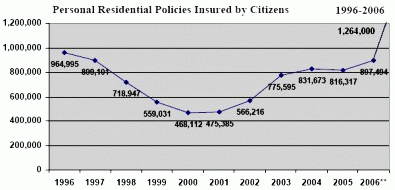 By leaving, they triggered the mutation of Citizens from a safety net into the largest insurer in Florida. Since its structure assesses any costs to policy holders across the state, it has inadvertently become a self-insurance vehicle. Not created to perform that function, nervous officials began engineering a divestiture of Citizens� current client load. A recent board action precludes it from covering properties valued in excess of $1 million. Already encumbered by 1,264,000 property owners as of October 2006, Citizens is averaging 70,000 new policies per month. They are also feverishly dumping clients upon their acceptance by any commercial carrier, without concern for the carrier�s credibility or the premium cost. Insurance officials intend to extricate Citizens from its current level of commitment despite the absence of viable alternatives.
By leaving, they triggered the mutation of Citizens from a safety net into the largest insurer in Florida. Since its structure assesses any costs to policy holders across the state, it has inadvertently become a self-insurance vehicle. Not created to perform that function, nervous officials began engineering a divestiture of Citizens� current client load. A recent board action precludes it from covering properties valued in excess of $1 million. Already encumbered by 1,264,000 property owners as of October 2006, Citizens is averaging 70,000 new policies per month. They are also feverishly dumping clients upon their acceptance by any commercial carrier, without concern for the carrier�s credibility or the premium cost. Insurance officials intend to extricate Citizens from its current level of commitment despite the absence of viable alternatives.
 |
| GOVERNOR BUSH SIGNS INSURANCE BILL |
In what appears to be a contradictory policy, by removing the safety net prior to implementing a strategy to relieve the pressure on property owners, the State is salvaging the company at the expense of those it was created to assist. They would gladly implement that strategy - if they had one. The Administration and legislative leadership have come to the realization that they blew it. Raising a white flag, they passed SB 1980 toward the end of last year�s session. It created the statutory basis for removing price regulations. Anticipating an adverse public reaction, officials attempted to spin their capitulation as �progress�. A wag-the-dog explanation of the legislation characterized it as the first step in a return to normalcy. How is that? �If insurers are allowed to charge whatever they want, they will return. Once they return, good old-fashioned competition will pressure rates downward.�
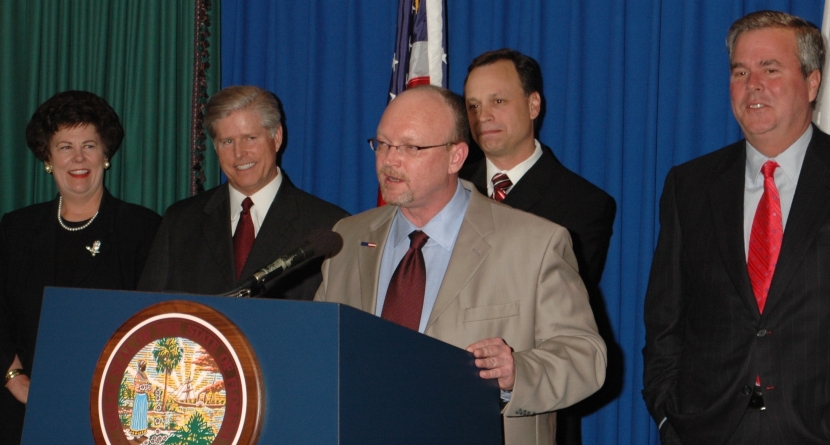 |
INS. COMMISSIONER KEVIN McCARTY, CFO TOM
GALLAGHER AND GOVERNOR AT SB 1980 BILL SIGNING |
Obviously, this ignores the fact that the industry is no longer driven by carriers frenetically undercutting one another. Since they were organized enough to overturn the State�s regulatory framework, what makes officials believe that they aren�t capable of seeing through this puerile plan? In actuality, they will emulate OPEC, setting their own price marks while thumbing their noses at the State. Angry civic leaders are questioning whether we were victimized by some passive collusion between the Industry and our supposed representatives. Although this crisis crystallized almost three years ago, legislators and insurance officials seemed to have belatedly awakened from a deep sleep, only now calling for crisis resolution.
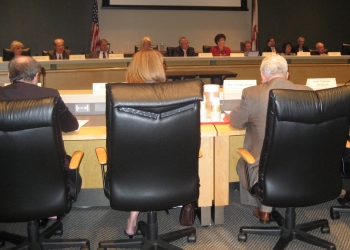 |
LT. GOVERNOR TONI JENNINGS HEADS FLORIDA
PROPERTY AND CASUALTY INSURANCE REFORM COMMITTEE |
The Governor realized that he needed a fresh perspective. On a wing and a prayer, he mandated the creation of the Florida Property and Casualty Insurance Reform Committee. Chaired by Lieutenant Governor Toni Jennings, the Committee is composed of State insurance officials and legislators and is counseled by a �Technical Committee� comprised of industry executives. On November 15th, the Committee released their �Final Report and Recommendations.�
In fulfilling the Governor�s mandate �to examine the Florida insurance market and make recommendations to reduce the cost of premiums, increase the availability of insurance, and reduce the risk to homeowners and businesses,� the committee took 90 days to compile a 230 page report. Included are 6 pages of what the committee entitled �initial recommendations�. The 51 recommendations fall into 9 relevant categories. Some highlights of the Committee�s handiwork are as follows:
Recommendations under the category �Residential Insurance Market/Consumer Issues�, include
- more transparency for consumers by requiring the premium notice and policy to specify premium mitigation discounts available by dollar amount;
- identifying the dollar amount of the agent�s commission;
- identifying the amount of any premium increase that is due to a rate increase and the amounts that are due to a change in coverage;
- requiring plain language in insurance policies; requiring that insurers offer a policy that excludes windstorm coverage from a residential property insurance policy if the policyholder signs an approved written rejection of such coverage;
- the elimination of maximum allowable deductibles; i.e. allow insurers to offer deductibles of any amount in addition to the 2%, 5% or 10% deductibles currently offered.
Under the category �Florida�s Commercial Insurance Market/Property Casualty Joint Underwriting Association (PCJUA)� is
- adoption of statutory language that would allow risk pooling for windstorm property coverage for all �like� entities such as public hospitals, public educational facilities and community colleges;
- development of a plan to depopulate Citizens commercial risks to either the PCJUA or create a new statewide entity for all commercial risks.
 Entries under �Florida Building Code� include
Entries under �Florida Building Code� include
- development of a code plus standard that the insurance industry would recognize for maximizing premium discounts;
- encouraging local governments to �promote and advocate for code plus structures by providing incentives to builders like density bonuses, lower impact fees, and concurrency credits when new construction is built at higher levels than the current approved building code.�
Under the �Reinsurance Market� category, they offer a recommendation to �reduce or eliminate the trust fund (collateral) requirement for non-U.S. (foreign) insurers based on a determination by the OIR of the adequacy of regulation of the country of licensure and the financial strength of the assuming insurer.�
The report�s first 108 pages provide background and perspective for the Committee�s opinions. They also review the rationale behind their recommendations. For instance, the insurance carriers contend that they are only passing through reinsurance increases to policy holders. As such, the Committee examined the underlying rationale for the reduced reinsurance capacity in the Florida property market.
 Direct writers, such as State Farm, Allstate, etc., are able to provide coverage for relatively high risk policies, such as property insurance policies, by spreading their exposure to the reinsurance market. A reinsurance company essentially provides insurance to an insurance company. By laying off some of their potential risk, carriers can limit their losses. When Florida property insurers (both residential and commercial) submitted their rate filings to the OIR, factored in were significant reinsurance rate increases, resulting in requests for commensurate rate increases to the insurance buying public.
Direct writers, such as State Farm, Allstate, etc., are able to provide coverage for relatively high risk policies, such as property insurance policies, by spreading their exposure to the reinsurance market. A reinsurance company essentially provides insurance to an insurance company. By laying off some of their potential risk, carriers can limit their losses. When Florida property insurers (both residential and commercial) submitted their rate filings to the OIR, factored in were significant reinsurance rate increases, resulting in requests for commensurate rate increases to the insurance buying public.
 In addition to considering the losses from the eight hurricanes of 2004 and 2005, the report lists these factors as also contributing to the reinsurance tightening supposedly responsible for the trebling of insurance premiums:
In addition to considering the losses from the eight hurricanes of 2004 and 2005, the report lists these factors as also contributing to the reinsurance tightening supposedly responsible for the trebling of insurance premiums:
- Predictions of increased frequency and severity of future hurricanes by the hurricane modeling firms;
- Increased property values in which a similar book of business created a much higher exposure;
- Increased coastal exposure throughout the state;
- Increased cost of repair and rebuilding due to demand of building supplies and labor (demand surge) and;
 More strict requirements by ratings agencies (A.M. Best, Standard & Poors and Moody�s) for reinsurers to maintain favorable financial ratings.
More strict requirements by ratings agencies (A.M. Best, Standard & Poors and Moody�s) for reinsurers to maintain favorable financial ratings.
 There is no contention over the recent increase in South Florida property values. However, premium increases included in 2004 policy renewals already reflected higher valuations as of their renewal dates. Likewise, premium increases in the 2005 renewals considered the prior year�s jump in value. The 2006 renewals should only reflect any change in value from 2005. That single-year percentage increase in property values only marginally contributes to the 250% - 350% increases supposedly being �passed through.�
There is no contention over the recent increase in South Florida property values. However, premium increases included in 2004 policy renewals already reflected higher valuations as of their renewal dates. Likewise, premium increases in the 2005 renewals considered the prior year�s jump in value. The 2006 renewals should only reflect any change in value from 2005. That single-year percentage increase in property values only marginally contributes to the 250% - 350% increases supposedly being �passed through.�
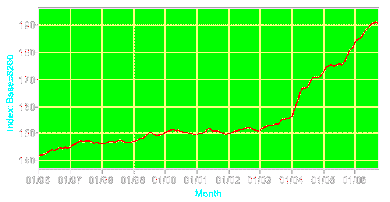 |
| INCREASE OVER TEN YEARS FOR CONSTRUCTION MATERIALS (BLS) |
The demand for repairs and rebuilding skyrocketed following the two destructive seasons. The cost of building supplies has been climbing steadily for years, especially copper, cement, aluminum, steel and pre-stressed concrete. When demand intensified, the construction industry stepped into a sellers� market � creating a competitive premium on labor costs. Although demand has unquestionably increased repair costs, the mid-double digit percentage increase (21% over two years - Bureau of Labor Statistics) does not support the trebling of premiums.
Since oceanfront property in Florida is always in demand, it�s a prime target for development. While this steadily adds to the inventory of shoreline properties, the annual percentage increase is nominal. In fact, much of the oceanfront development is reconstruction � where older existing structures are replaced by newer ones. In compliance with the Florida Building Code and local codes, new construction must contain windstorm mitigating components not found in the buildings they replace. As coastal development evolves, the increased storm mitigation will lower the risk of windstorm damage, not increase exposure.
 While these three factors play a part in elevating reinsurers� exposure, they clearly do not account for a 300% rate boost from 2005 to 2006. Most of the increased property values were accounted for by 2005 and included in the 2005 renewal cost. The new coastal construction, given its required inherent mitigation features, is less prone to storm damage than earlier coastal construction, lowering coastal risk exposure. Appreciated construction costs are dwarfed by the 300% increase in premiums.
While these three factors play a part in elevating reinsurers� exposure, they clearly do not account for a 300% rate boost from 2005 to 2006. Most of the increased property values were accounted for by 2005 and included in the 2005 renewal cost. The new coastal construction, given its required inherent mitigation features, is less prone to storm damage than earlier coastal construction, lowering coastal risk exposure. Appreciated construction costs are dwarfed by the 300% increase in premiums.
That leaves two remaining factors to account for the vast majority of the increase. As their primary justification, reinsurers point to predictions of increased frequency and severity of future hurricanes by the hurricane modeling firms. Responding to queries about the botched forecast for Hurricane Ernesto, Director Max Mayfield of the National Hurricane Center in Miami-Dade County explained, �The simple truth is there are some processes in hurricanes that we don�t understand yet, particularly storm intensity. I want people to understand: This is the state of the science. Some of the newer experimental forecast models would yield more reliable results but significant improvements are at least 10 to 15 years off. We�re headed in the right direction, but I�m not expecting miracles.� Mayfield said that our state of knowledge makes current predictive capabilities extremely short term. Beyond a few days, predictions are mostly guesswork tempered by history. As if to emphasize the arbitrary nature of existing hurricane models, 2006 passed without incident. The single event for which the State issued an alert � Ernesto � was downgraded to a Tropical Storm before reaching Florida.
 The final factor, and cloudiest, is the imposition by ratings agencies of increasingly strict requirements for reinsurers to maintain favorable financial ratings. While this may raise the bar for a reinsurer to demonstrate financial viability, it has virtually no impact on their exposure to risk.
The final factor, and cloudiest, is the imposition by ratings agencies of increasingly strict requirements for reinsurers to maintain favorable financial ratings. While this may raise the bar for a reinsurer to demonstrate financial viability, it has virtually no impact on their exposure to risk.
 At the end of the day, there is little correlation between the huge 2006 rate increases and the real world. The factors being promoted as �actuarial justifications� appear to be little more than arbitrary rationalizations. The new rate schedules combined with the newly legalized cherry picking currently being practiced foretell banner years for the carriers (as experienced by QBE last year).
At the end of the day, there is little correlation between the huge 2006 rate increases and the real world. The factors being promoted as �actuarial justifications� appear to be little more than arbitrary rationalizations. The new rate schedules combined with the newly legalized cherry picking currently being practiced foretell banner years for the carriers (as experienced by QBE last year).
Aside from the insurers, the only other beneficiaries of this dilemma are political ideologues antipathetic to regulations. Some plans filed last year extolled the virtues of allowing the insurance market to regulate itself, blaming the current crisis on the existing regulatory environment. Plan sponsors expressed delight with the current state of affairs. Notwithstanding anyone�s views on government regulation, when critically destructive rate increases go right to a company�s bottom line, it fails to pass the smell test.
While there are some contradictory elements in the report, there are also many constructive recommendations rooted in common sense. The report�s heavy focus on the relationship between construction mitigations and premium cost is intuitive. Weeding out costly regulations with no ostensible benefit and removing arbitrary obstacles to being an admitted carrier should promote productive competition.
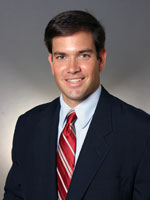 |
NEW HOUSE SPEAKER
MARCO RUBIO |
At present, the Committee�s recommendations apply only to residential property owners and not to community associations. Association members need to contact their legislators to insist that should any of the Committee�s recommendations be adopted, they must also extend to those living within common interest ownership communities and to their governing boards charged with insuring common areas.
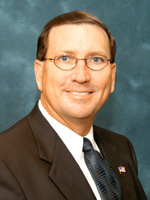 |
NEW SENATE PRESIDENT
KEN PRUITT |
The Committee also needs to shift into overdrive. Although empanelled in June, their initial official work product surfaced on November 15th, six months later. While most rational property owners are resigned to enduring this year�s insurance mauling, they need � and expect � relief before next year. If Governor Bush can align consensus among incoming House Speaker Marco Rubio, Senate President Ken Pruitt and other legislative leaders over what should be brought up at a December 4th Special Session and what should wait until a special session next year or the regular session in March, the Governor could see some of the Committee�s recommendations fast-tracked.
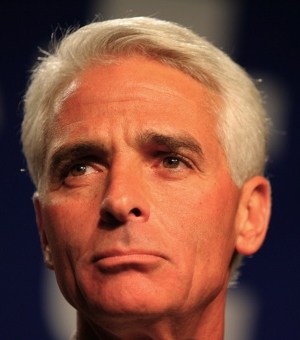 |
| GOVERNOR-ELECT CHARLIE CRIST |
The new legislative leadership has responded with trepidation. Ken Pruitt wants to touch base with Governor-elect Charlie Crist as well as Chief Financial Officer-elect Alex Sink to secure their blessing before moving on Bush�s request. While Republican Attorney Marco Rubio is amenable to tackling some of the more pressing Insurance issues at a Special Session, the success of his tenure will derive from his relationship with Crist and, to a lesser extent, new CFO Sink. In his campaign, Charlie Crist proposed setting total losses of $3.2 billion, rather than the current $5.3 billion, as the level at which insurance companies can tap into the Florida Hurricane Catastrophe Fund for reinsurance to help pay claims. Since the change should enable insurance companies to obtain more reinsurance at the CAT fund�s lower rates, he would mandate that those savings be passed through to homeowners.
 |
CHIEF FINANCIAL OFFICER-ELECT
ADELAIDE (ALEX) SINK |
Alex Sink, former president of Bank of America�s Florida operations, said she agrees with his proposal �with the caveat that [insurance companies] would look me in the eye and say, �If you do this, we will return to the Florida market.�� While Crist and Sink each support incepting a National Catastrophe Fund to buy reinsurance for claims on hurricanes and other natural disasters, Sink said a more achievable possibility is the creation of a regional fund, with coastal states from Texas to Maine participating. Curing the insurance dilemma was a key plank in both of their campaigns. Their decision about a Special Session will reveal the extent of their commitment.
If the Committee�s efforts produce results, the Administration will have slain an economic dragon and salvaged the Governor�s legacy. During the gubernatorial campaign, Governor Bush refused to endorse either CFO Tom Gallagher or Attorney General Charlie Crist, both of whom served with Bush in the Florida Cabinet. The question then becomes, does Charlie Crist care about saving Bush�s legacy? By waiting until January 2nd, Crist and Sink can chalk up any progress to their own legacies. Although a delay of one month won�t make much difference in their implementing of the Committee�s recommendations, the effectiveness of these recommendations certainly will. If they fail to impact rates, we�re on our own.
The Galt Mile Community Association is currently investigating alternatives to this potential eventuality. Progress will be reported at future Presidents Council meetings.
 P.S. - On November 29th, Governor-elect Charlie Crist, Senate President Ken Pruitt, and House Speaker Marco Rubio announced their intention to �call a Special Session of the Florida Legislature starting January 16, 2007 to begin an effort to restructure Florida�s property insurance market and provide relief to Florida residents and businesses.� What a surprise! It appears as if Governor Bush will just have to sit back and wait... like the rest of us.
P.S. - On November 29th, Governor-elect Charlie Crist, Senate President Ken Pruitt, and House Speaker Marco Rubio announced their intention to �call a Special Session of the Florida Legislature starting January 16, 2007 to begin an effort to restructure Florida�s property insurance market and provide relief to Florida residents and businesses.� What a surprise! It appears as if Governor Bush will just have to sit back and wait... like the rest of us.
Click To Top of Page
Property Insurance Conference



Florida House Holds Pre-Session Pow-wow

 |
| Representative Ellyn Bogdanoff |
December 6, 2006 - District 91 Statehouse Representative Ellyn Setnor Bogdanoff notified the Galt Mile Community Association about an ongoing conference being held by the Florida House of Representatives to address the current property insurance crisis. The three-day conference appears to be a pre-session brainstorming effort in preparation for what House Speaker Mario Rubio called, �a Special Session of the Florida Legislature starting January 16, 2007 to begin an effort to restructure Florida�s property insurance market and provide relief to Florida residents and businesses.� Ellyn�s message is as follows:
�I don�t have to remind you that soaring insurance costs are hurting Floridians. To address this, Speaker Rubio invited everyone to bring their best ideas to Tallahassee for a three-day conference to solve this crisis. He welcomed all ideas - Democrat and Republican - and discussed them openly and frankly. From this, consensus issues are beginning to emerge:
- Cleaning up Citizens Property Insurance and holding its leaders accountable.
- Making sure that all houses are built to the strongest standard and have the strongest protections, regardless of where they are in the state.
- Expanding our efforts to help homeowners stormproof their homes and lower their insurance rates by being prepared.
- Lowering the cost of reinsurance and directing those savings to homeowners.
However, one issue was clear: The legislature knows they have to find a solution to lower insurance rates for Floridians and make sure that insurance companies treat Florida homeowners fairly.
We understand how important solving the insurance crisis is for Floridians. Our office will continue to seek out good ideas wherever we can find them, listen to the homeowners and small business owners in our community, and come back to Tallahassee on January 16th ready to act and bring real insurance relief to Floridians.
Please don�t hesitate to contact me at [email protected] with any additional questions or concerns you may have.�

 Would you like to see events as they unfold? Please Click Here to view the House Conference - LIVE!
Would you like to see events as they unfold? Please Click Here to view the House Conference - LIVE!
Click To Top of Page
To GMCA HOME
To ISSUES INDEX
To TALLAHASSEE POLITICS PAGE
To TALLAHASSEE ARCHIVE
To TALLAHASSEE ARCHIVE - 2018
To TALLAHASSEE ARCHIVE - 2017
To TALLAHASSEE ARCHIVE - 2016
To TALLAHASSEE ARCHIVE - 2015
To TALLAHASSEE ARCHIVE - 2014
To TALLAHASSEE ARCHIVE - 2013
To TALLAHASSEE ARCHIVE - 2012
To TALLAHASSEE ARCHIVE - 2011
To TALLAHASSEE ARCHIVE - 2010
To TALLAHASSEE ARCHIVE - 2009
To TALLAHASSEE ARCHIVE - 2008
To TALLAHASSEE ARCHIVE - 2007
To TALLAHASSEE ARCHIVE - 2005
To TALLAHASSEE ARCHIVE - 2004
To TALLAHASSEE ARCHIVE - 2003
To FIRE SAFETY PAGE
To SHORE PROTECTION PAGE
To EMERGENCY ROOM PAGE
To CITY OF FORT LAUDERDALE PAGE
To FORT LAUDERDALE BUDGET CRISIS PAGE
To BROWARD COUNTY PAGE
To AUTOMATED EXTERNAL DEFIBRILLATOR PAGE
To 32nd STREET ALLEY PAGE
To FLPD CRIME STATISTICS
To MAIN PAGE
To GOVERNANCE
To REPORT CARD
To LAWS & STATUTES
To GOVERNMENT LINKS
Click To Top of Page